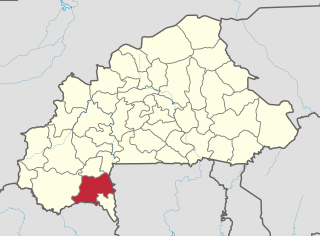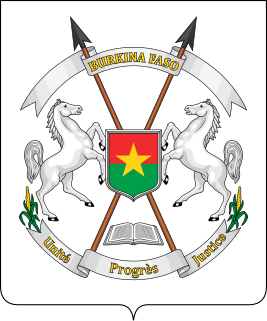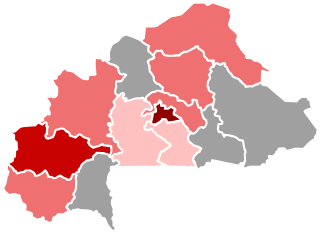| |||||
| Decades: | |||||
|---|---|---|---|---|---|
| See also: | |||||
Events in the year 1999 in Burkina Faso .
| |||||
| Decades: | |||||
|---|---|---|---|---|---|
| See also: | |||||
Events in the year 1999 in Burkina Faso .

Burkina Faso is a landlocked country in West Africa with an area of 274,200 km2 (105,900 sq mi), bordered by Mali to the northwest, Niger to the northeast, Benin to the southeast, Togo and Ghana to the south, and the Ivory Coast to the southwest. It has a population of 20,321,378. Previously called Republic of Upper Volta (1958–1984), it was renamed Burkina Faso by President Thomas Sankara. Its citizens are known as Burkinabè, and its capital and largest city is Ouagadougou.

The Burkina Faso national football team, represents Burkina Faso in men's international football and is controlled by the Burkinabé Football Federation. They were known as the Upper Volta national football team until 1984, when Upper Volta became Burkina Faso. They finished fourth in the 1998 Africa Cup of Nations, when they hosted the tournament. Their best ever finish in the tournament was the 2013 edition, reaching the final.

Poni is one of the 45 provinces of Burkina Faso, located in its Sud-Ouest Region.

Burkina Faso has sent athletes to every Summer Olympic Games held since 1988. Under its previous name of Upper Volta (VOL), the country also competed in 1972. After appearing in eight different Olympics, Burkina Faso won their first Olympic medal at the 2020 Summer Olympics, following Hugues Fabrice Zango's bronze-winning performance in the men's triple jump. No athletes from Burkina Faso have competed in any Winter Olympic Games.

The Constitution of Burkina Faso was approved by referendum on 2 June 1991, formally adopted 11 June 1991 and last amended in January 2002. The last amendment abolished the upper chamber of the parliament, the Chamber of Representatives.

Charles Kaboré is a Burkinabé professional footballer who plays as a defensive midfielder for French Ligue 2 club Niort and the Burkina Faso national team. A Burkina Faso international since 2006, he has become the country's most capped player.
Events from the year 2007 in Burkina Faso.

Burkina Faso made its Paralympic Games début at the 1992 Summer Paralympics in Barcelona, sending a tandem of cyclists, a judoka and a weightlifter. The country was represented by a cycling tandem and a powerlifter in 1996, and by a single powerlifter in 2000. Burkina Faso did not take part in the 2004 Games, but returned to the Paralympics in 2008, sending a single cyclist.

Burkina Faso–Denmark relations refers to the current and historical relationship between Burkina Faso and Denmark. Burkina Faso has an embassy in Copenhagen, and Denmark has an embassy in Ouagadougou.

The Burkina Faso women's national football team represents Burkina Faso in international women's football. It is governed by the Burkinabé Football Federation. It played its first match on 2 September 2007 in Ouagadougou against Niger and won 10–0, the best result till today. Its next matches were against Niger (5–0) and Mali (2–4).
The following lists events that happened during 2016 in Burkina Faso.

Burkina Faso–China relations refers to the foreign relations between Burkina Faso and China. Burkina Faso has an embassy in Beijing and China has an embassy in Ouagadougou.

The COVID-19 pandemic in Burkina Faso is part of the ongoing worldwide pandemic of coronavirus disease 2019 caused by severe acute respiratory syndrome coronavirus 2. The virus was confirmed to have reached Burkina Faso on 9 March 2020. The death of Rose Marie Compaoré, a member of the National Assembly of Burkina Faso, on 18 March marked the first recorded fatality due to COVID-19 in Sub-Saharan Africa.
Events in the year 2013 in Burkina Faso.

Chamber of Representatives of Burkina Faso was the upper house of the bicameral legislature of Burkina Faso from 1991 to 2002.

Burkina Faso started vaccinating against COVID-19 on 2 June 2021.
Events in the year 2009 in Burkina Faso.
Events in the year 2006 in Burkina Faso.
Capital punishment is a legal penalty in Burkina Faso. It has been abolished for all offenses except war crimes, making the country "Abolitionist for Ordinary Crimes," along with Brazil, Chile, El Salvador, Guatemala, Israel, and Peru. Before the partial abolition of capital punishment in 2018, capital punishment had been abolished de facto. Its last execution was performed in 1988.